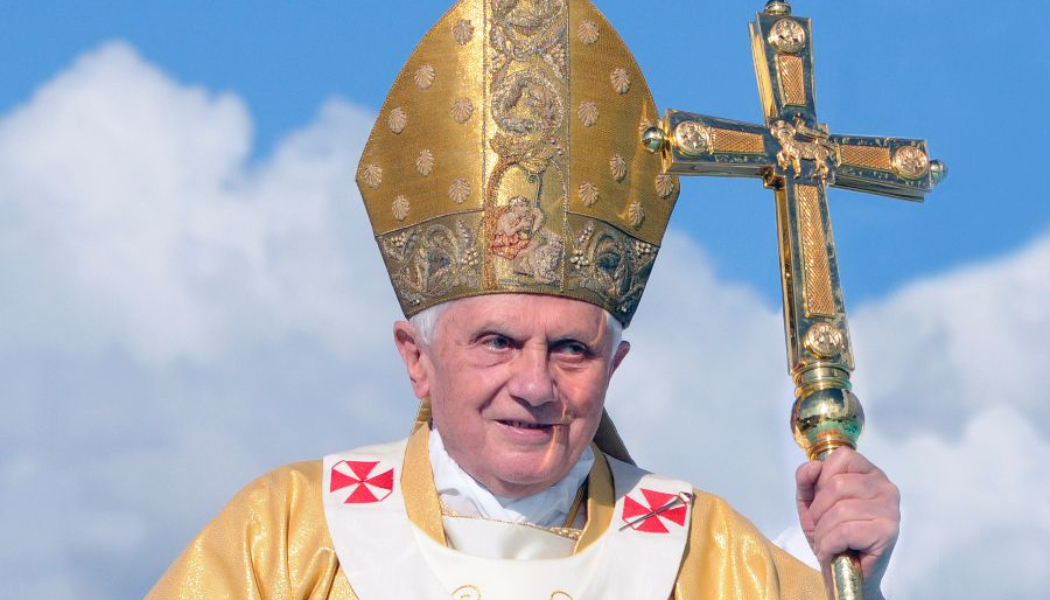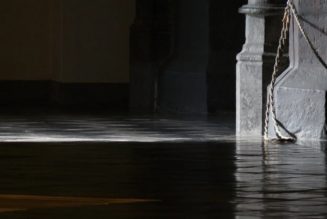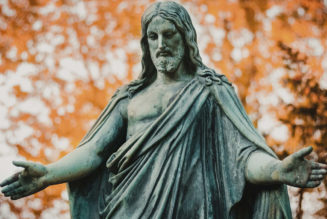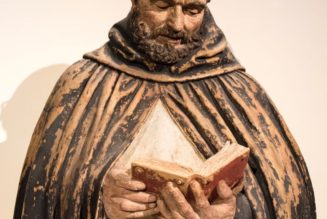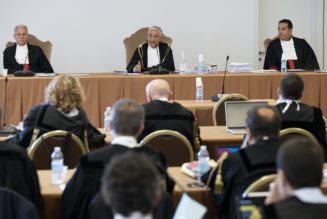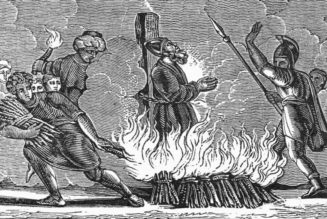Hey everybody,
God rest Pope Benedict XVI.
If you haven’t already done this, take a minute right now to pray for the repose of Benedict’s soul, and to pray in thanksgiving for both his life and the saving mystery of Jesus Christ, to which Benedict gave himself intellectually, pastorally, and spiritually.
May perpetual light shine upon him. May he enter the eternal glory of the Lord, Jesus Christ.
For many Catholics today, Benedict’s own words, preached at the funeral of Pope St. John Paul II, ring true:
“Our hearts are full of sadness, yet at the same time of joyful hope and profound gratitude.”
—
I am writing this Tuesday Pillar Post from the airport, as I get ready to board a plane for Rome, where Ed and I will report on the mourning and funeral Mass of Benedict XVI, and spend some time in Rome talking with people about his legacy.
In the next few days, The Pillar’s full team will have robust and intelligent coverage of this moment in the life of the Church. But like a lot of you, I’ll also be praying for Benedict’s soul, and reflecting on the place of the late former pope in my own life.
I’ll write more about that after I bring you the news — which, as you can imagine, has been mostly occupied with the death of Pope Benedict XVI.
—
First, if you haven’t read it, The Pillar’s obituary of Benedict XVI aims to give you a thorough picture of the man’s life, his ministry, and his place in the life of the Church, in which he has been a singularly influential figure for decades, spanning back to the influence of his theological work on the texts of the Second Vatican Council itself.
If you don’t know much about Benedict XVI’s life, or you want to learn a few things that might surprise you, this biographical sketch is a very good place to start.

—
Next, Luke Coppen on Saturday published a bit of a reader’s guide on Benedict XVI, aimed at suggesting a few entry points into the theological and spiritual work of one the Church’s most prolific minds, probably in all of history.
If you haven’t read much of the late former pontiff’s work, we’ve aimed to make a few suggestions here. We hope it’s helpful.
Of course, if you’ve read a lot of the late former pontiff’s work, you probably have your own set of suggestions about what we might have included, and, well, you’re probably right. Whatever you would have suggested is probably a pretty profound work. The deal with a reader’s guide is the challenge of being selective, and for my money, Luke’s done a pretty good job here.
But several of you have already noted the omission of “The Spirit of the Liturgy” from this list. There is a reason for that: Later this week, we’ll have a very engaging report on the liturgical thought and praxis of Benedict XVI, a hugely important part of his life and identity. So stay tuned.
—
To date, several U.S. dioceses have provided their priests with some guidance regarding the liturgical possibilities for mourning Benedict.
Most of that guidance is based on a Dec. 30 memo from the USCCB, which we reported about this weekend. If you celebrate the sacred liturgy, or if you’re curious about some of the longstanding liturgical customs for mourning a pontiff, you can check out our report right here.
—
When Benedict died at 95, he had the distinction of being the second-oldest man in the Church’s history to have served in the See of Peter.
And at 86, Pope Francis has secured a spot as one of the 10 oldest popes in history.
Indeed, both the average age and length of reign are increasing among popes, and that could have some interesting implications for the Church.
In a report unlike anything else you’ll find anywhere else, Brendan Hodge broke down the numbers on papal ages across Church history, and made some pretty cool interactive charts in the process:
That chart, for example, isn’t interactive in this post. But if you click over to this story, you can scroll over the dots to see where every pope lines up.
Brendan also took note of the most interesting historical outliers, including Pope St. Agatho, who was elected the Roman Pontiff at age 101, and Pope John XII, who might have become pope at age 18, and who generally made a mess of things.
Really, this is a very cool report. Check it out.
—
Next, the death of Pope Benedict XVI has raised, as you can probably imagine, a lot of discussion about the meaning and significance of the late former pope’s 2013 resignation. To be honest, I’ve been surprised this week by how much both Catholic and secular media sources have gotten wrong about both the theological and practical elements of a papal resignation.
That Benevacantism stuff is pretty wild, by the way, plus this explainer has an excursus on the fascinating distinction between sacred orders and ecclesiastical office. And who would want to miss that?
So read all about Benedict’s really big decision – the papal resignation – right here. And pass this explainer on when your friends tell you there were really two popes until Benedict died.
—
Now on to some news analysis:
Ed Condon argued yesterday that the most significant legacy of his papacy is that “it was Pope Benedict who gave the Church Pope Francis.”
Ed makes the interesting point that:
A pope intent on steering an orderly succession to a chosen candidate could have promoted a critical number of “reliable” cardinal electors to help deliver a result. But Benedict did not do so.
He could also have simply waited several months more before announcing his resignation, to see a sizable turnover in the college — 10 of the 117 voting-age cardinals, including several widely held to be key Francis supporters — would have turned 80 and aged out of the conclave by the end of that year.
Indeed, had he timed his resignation to take effect only a week later, Cardinal Walter Kasper, the longtime theological sparring partner of Benedict’s – and a key influence on both the first years of the Francis pontificate and the apostolic exhortation Amoris laetitia – would have been excluded.
Benedict chose none of those options, despite surely being aware of them.
And looking over the list of 2013 cardinal electors with hindsight, many might conclude that only that conclave could have produced Pope Francis — and only Benedict’s resignation at that exact time could have brought it about.
I don’t agree with his assessment that the election of Francis is the most significant fruit of the Benedictine papacy. I think Benedict’s intellectual and spiritual contributions, as pope, will shape the Church for more than a century. But I do think Ed makes some interesting points about the Kremlinology of conclaves.
But give it a read. You might think Ed is spot on, even if I don’t. He’s a pretty smart guy. And you can tell us who’s right in the comments below.
—
For my part, I took a look yesterday at the persistent idea that with the death of Benedict, Pope Francis himself might soon resign.
I don’t think so.
In fact, I think that any pope, current or future, who looks at the life of Pope emeritus Benedict over the past 10 years will think twice about resigning, and probably not do it.
Why am I bucking the conventional wisdom of Vatican watchers everywhere?
Because I’m kind of a contrarian, sure.
But here’s why I think that papal resignations will not become a pontifical trend. Let me know whether I’m wrong about this.
In other news
Ok, we’ll have a lot more about Benedict XVI in the days to come, including on-the-ground coverage from the pope’s funeral — thanks to our subscribers and supporters, of course.
But here’s some other news we’ve covered since our last Pillar Post:
In French Guiana, the Holy See has found retired Bishop Emmanuel Lafont guilty of sexual abuse and ordered him to observe a life of prayer and penance at a French monastery.
The bishop is also facing a police investigation for human trafficking, breach of trust, and aiding illegal residents. He is accused of coercing young migrant men, whom he invited to live in his episcopal residence, into sex. The bishop is expected to face criminal charges, local sources say.
—
Days before Christmas, Christians in Nigeria buried 40 people killed in terror attacks in the northern Nigerian state of Kaduna, where several villages were attacked and burned last month by suspected terrorists from the Fulani tribe of northern Nigeria.

The devastation is harrowing, as entire villages were burned — but the local diocese encouraged Catholics and other Christians to continue pushing the government to prosecute terrorists, and to be vigilant about defending their own villages from violence.
Pray for the Church in Nigeria.
—
Last night, we reported on a 2017 letter from Bishop Patrick Zurek to (then)Fr. Frank Pavone, laying out allegations of serious and consistent disobedience, and explaining that Zurek would begin laicization proceedings unless Pavone decided to be laicized voluntarily.
The letter answers a lot of questions about Pavone’s laicization, which was announced last month, and also disputes much of Pavone’s own narrative about his relationship with his bishop, and his attempts to transfer his incardination to another diocese.
You can read all about it right here.
Some anniversaries
Tomorrow, The Pillar will celebrate two years since our launch, and the grace and blessings of God in our work since we began. I’m grateful that some of us can celebrate that two year anniversary in Rome, at the heart of the Church, and recommit ourselves to the mission of serious and faithful journalism from the heart of the Church.
That’s what we want to do, as sons and daughters of the Church, called to live the fullness of our baptism.
And of course, that happens because of subscribers and supporters. We chose a business model that depends on you, because you hold us accountable to truth — if you trust our reporting, subscribe and support it — help keep trustworthy, serious, intelligent, informed, faithful Catholic journalism going.
We’re grateful.
And if you would, please say a prayer for my beloved Mrs. Flynn, my wife. We’ll celebrate on Saturday 17 years of a graced and loving marriage — except I’ll be in Rome, and Mrs. Flynn will be holding down the fort at home. My wife is a beautiful woman, and much closer to being a saint than I am.
In fact, when our 17 years together have been blessed, it’s because of God’s grace and Kate’s graciousness. When they’ve been hard, it’s usually because I’ve failed to cooperate with one or both.
We’ll celebrate when I get home from Rome, but if you would, offer up a prayer for my wife, as I pray in gratitude for her, and for the gift of our marriage.
(Also, I have some good reminders to bring home from Rome an anniversary present, and I won’t forget!)
‘Becoming different’
In 2005, I walked with a group of pilgrims from Brussels, Belgium to Cologne, Germany for World Youth Day — the first major global event of Benedict XVI’s papacy.
As we waited for the pope’s arrival, I wondered how he would present himself before a massive global audience of young people. Benedict was scholarly, shy, retiring, and he followed John Paul II, a pope who was larger than life, a global icon, who filled every space he entered, no matter how large.
I wondered how the quiet professor would fare at the Church’s largest youth festival — at “Catholic Woodstock,” as World Youth Day is sometimes called.
Here’s what amazed me — at that gathering, and at so many gatherings thereafter, Benedict was himself. He didn’t try to be a rock star. He was meek, and unassuming, no matter the size of the crowd.
In fact, he took up so many symbols of the papacy – the red shoes, the fur-lined caps – because he wanted to remind the world that the pope was a “steward of the mysteries” — that the Petrine Office was a continuity between the baptized and Jesus Christ himself. That the connection mattered, being a link in a chain, much more than the particular man in the chair.
That wasn’t a repudiation of John Paul II, it wasn’t a rebuke — Benedict loved JPII. But it was the way he saw, presented, and lived the papacy, and it was beautiful.
At World Youth Day, during several speeches and homilies from Benedict, I was struck by the way a grandfatherly professor could keep hundreds of thousands captive while he read a paper, in a very different style than the booming and emotive oratory of his predecessor.
Why did they listen — then and thereafter? Because the pope’s meekness was palpable. It was effusive through everything he did that Benedict was a disciple of Jesus Christ, a Christian, and a man of humility and prayer.
There was power in his meekness — and that’s a lesson for all of us.
Because we celebrate soon the Epiphany, I share with you an excerpt from Benedict’s reflection at that World Youth Day on the Magi, who brought their gifts to Jesus Christ:
In our pilgrimage with the mysterious Magi from the East, we have arrived at the moment which St Matthew describes in his Gospel with these words: “Going into the house (over which the star had halted), they saw the child with Mary his mother, and they fell down and worshipped him”. Outwardly, their journey was now over. They had reached their goal.
But at this point, a new journey began for them, an inner pilgrimage which changed their whole lives. Their mental picture of the infant King they were expecting to find must have been very different. They had stopped at Jerusalem specifically in order to ask the King who lived there for news of the promised King who had been born. They knew that the world was in disorder, and for that reason their hearts were troubled.
They were sure that God existed and that he was a just and gentle God. And perhaps they also knew of the great prophecies of Israel foretelling a King who would be intimately united with God, a King who would restore order to the world, acting for God and in his Name.
It was in order to seek this King that they had set off on their journey: deep within themselves they felt prompted to go in search of the true justice that can only come from God, and they wanted to serve this King, to fall prostrate at his feet and so play their part in the renewal of the world. They were among those “who hunger and thirst for justice.” This hunger and thirst had spurred them on in their pilgrimage – they had become pilgrims in search of the justice that they expected from God, intending to devote themselves to its service.
Even if those who had stayed at home may have considered them Utopian dreamers, they were actually people with their feet on the ground, and they knew that in order to change the world it is necessary to have power. Hence, they were hardly likely to seek the promised child anywhere but in the King’s palace. Yet now they were bowing down before the child of poor people, and they soon came to realize that Herod, the King they had consulted, intended to use his power to lay a trap for him, forcing the family to flee into exile.
The new King, to whom they now paid homage, was quite unlike what they were expecting. In this way they had to learn that God is not as we usually imagine him to be. This was where their inner journey began. It started at the very moment when they knelt down before this child and recognized him as the promised King. But they still had to assimilate these joyful gestures internally.
They had to change their ideas about power, about God and about man, and in so doing, they also had to change themselves. Now they were able to see that God’s power is not like that of the powerful of this world. God’s ways are not as we imagine them or as we might wish them to be.
God does not enter into competition with earthly powers in this world. He does not marshal his divisions alongside other divisions. God did not send 12 legions of angels to assist Jesus in the Garden of Olives. He contrasts the noisy and ostentatious power of this world with the defenceless power of love, which succumbs to death on the Cross and dies ever anew throughout history; yet it is this same love which constitutes the new divine intervention that opposes injustice and ushers in the Kingdom of God.
God is different – this is what they now come to realize. And it means that they themselves must now become different, they must learn God’s ways.
…
The Magi from the East are just the first in a long procession of men and women who have constantly tried to gaze upon God’s star in their lives, going in search of the God who has drawn close to us and shows us the way.
It is the great multitude of the saints – both known and unknown – in whose lives the Lord has opened up the Gospel before us and turned over the pages; he has done this throughout history and he still does so today. In their lives, as if in a great picture-book, the riches of the Gospel are revealed. They are the shining path which God himself has traced throughout history and is still tracing today. …
[Saints] show us the way to attain happiness, they show us how to be truly human. Through all the ups and downs of history, they were the true reformers who constantly rescued it from plunging into the valley of darkness; it was they who constantly shed upon it the light that was needed to make sense – even in the midst of suffering – of God’s words spoken at the end of the work of creation: “It is very good.” …
The saints, as we said, are the true reformers. Now I want to express this in an even more radical way: only from the saints, only from God does true revolution come, the definitive way to change the world.
In the last century we experienced revolutions with a common programme – expecting nothing more from God, they assumed total responsibility for the cause of the world in order to change it. And this, as we saw, meant that a human and partial point of view was always taken as an absolute guiding principle. Absolutizing what is not absolute but relative is called totalitarianism. It does not liberate man, but takes away his dignity and enslaves him.
It is not ideologies that save the world, but only a return to the living God, our Creator, the guarantor of our freedom, the guarantor of what is really good and true. True revolution consists in simply turning to God who is the measure of what is right and who at the same time is everlasting love. And what could ever save us apart from love?
May we learn God’s ways. May we be truly human. May we become saints. Each and every one of us.
Please let me know in the comments what Ed and I can pray for at the funeral of Benedict XVI. We’d like to pray for you.
Please be assured of our prayers, and please pray for us. We need it!
(ALSO, my first flight is now delayed. I should still have plenty of time to make my connection and get to Rome, but I’m a little nervous about that. So pray that my first plane is particularly speedy! I’d be very grateful.)
In Christ,
JD Flynn
editor-in-chief
The Pillar
Join Our Telegram Group : Salvation & Prosperity
